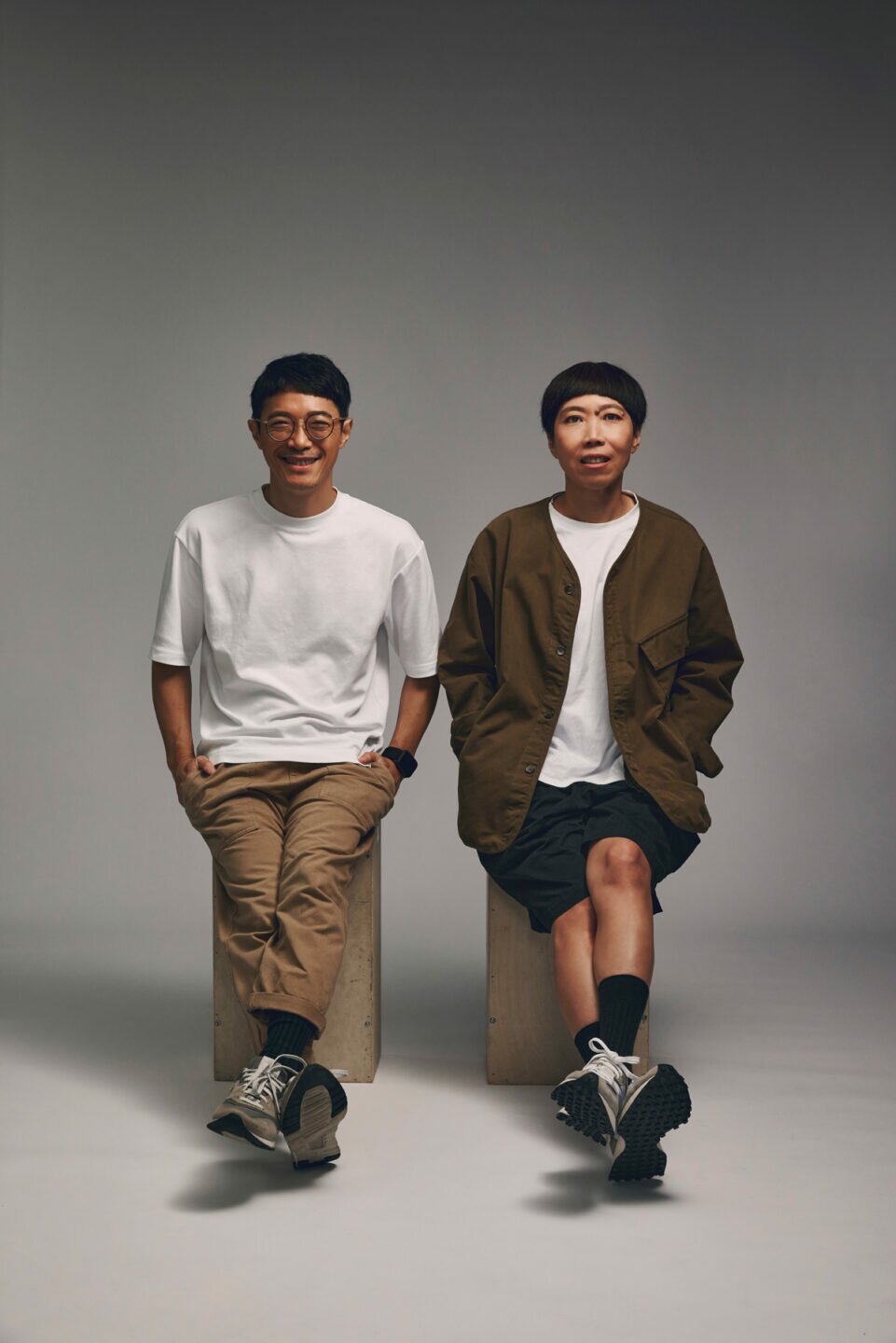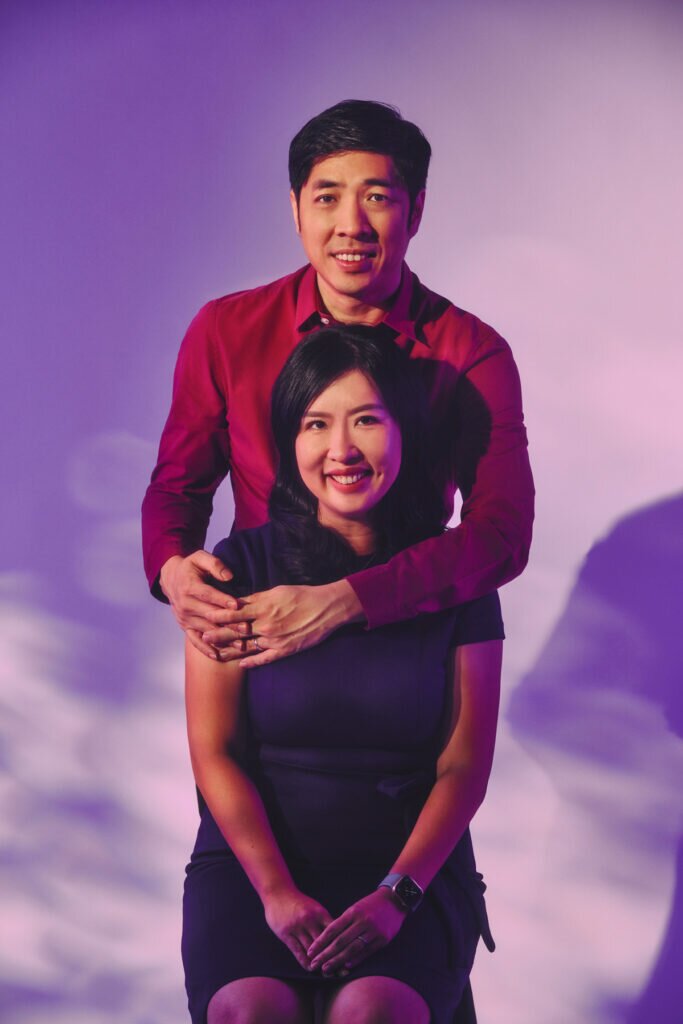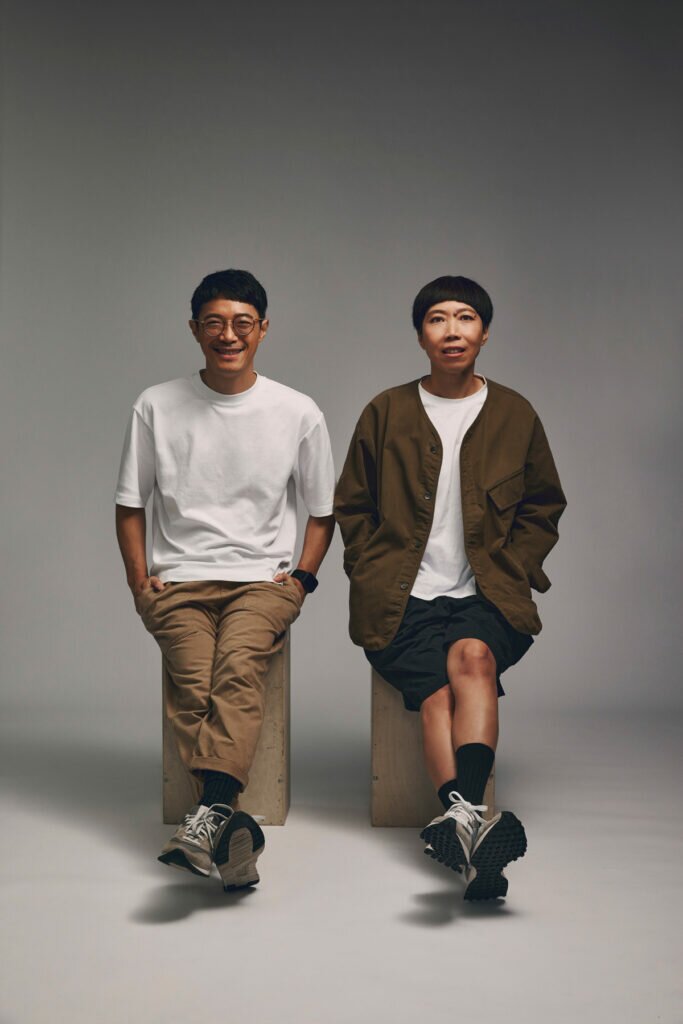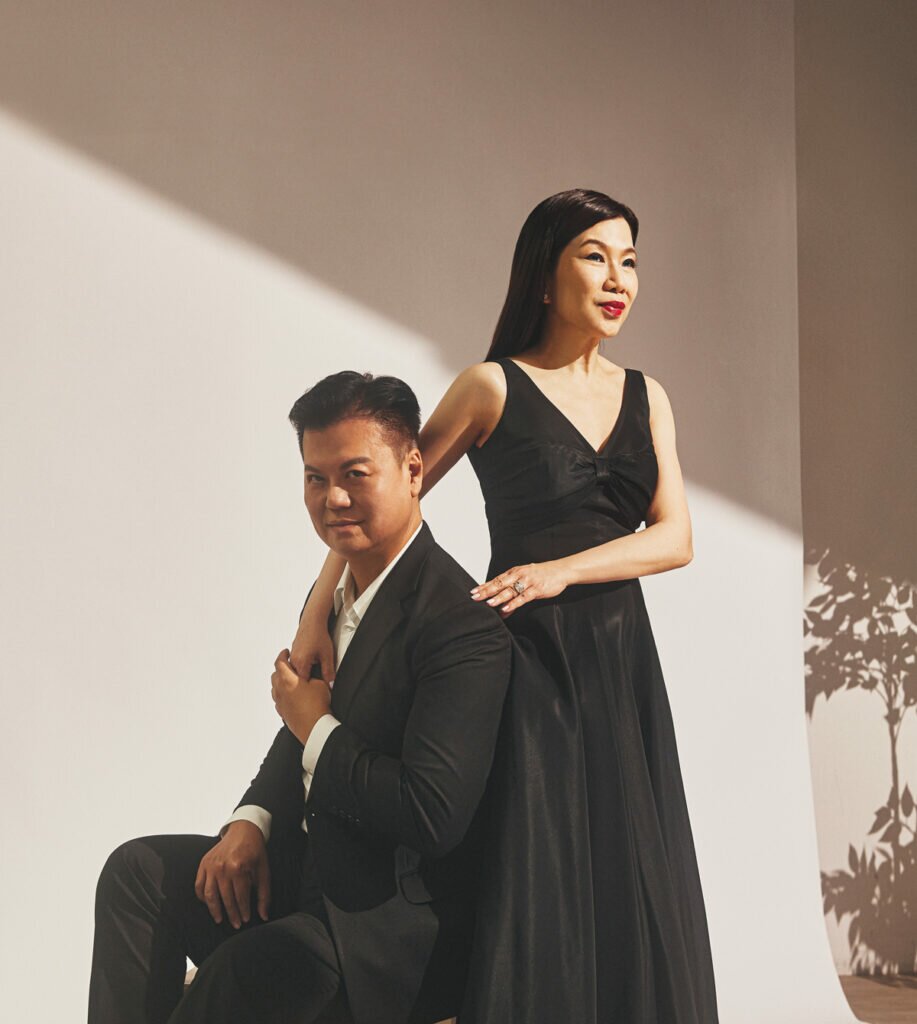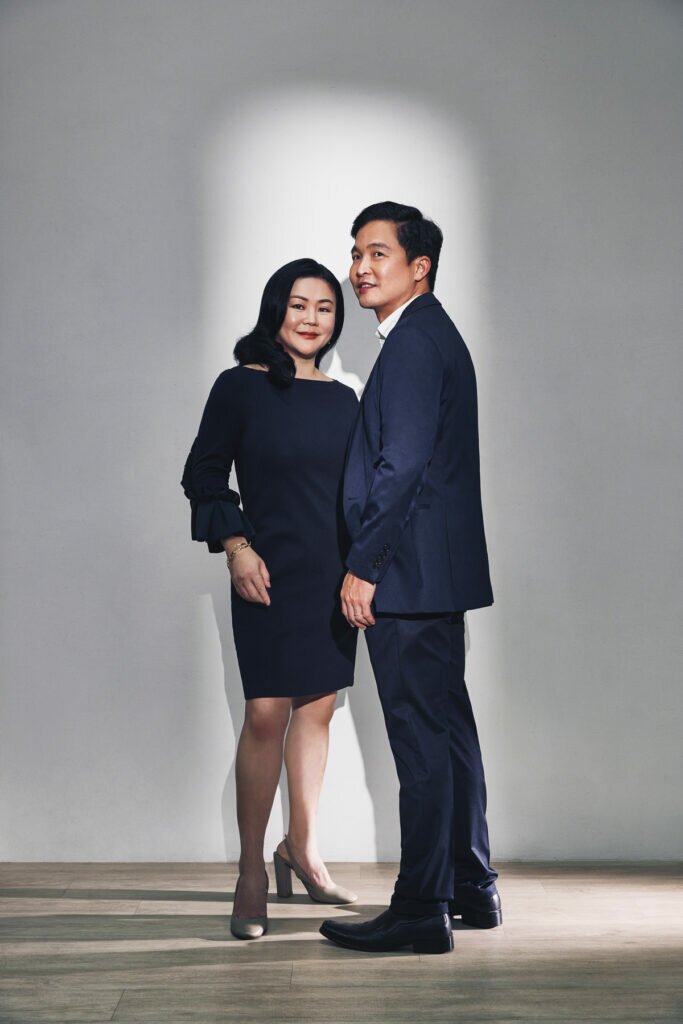Whether you’re guilty of schadenfreude, 2021’s cause celebre breakups that erupted like a tyre fire burnt into salacious headlines were a welcome distraction from a litany of Covid-19 reports. None were quite as riveting as the feud between the estranged influencers behind content production house Night Owl Cinematics, complete with calumny, ugly crying, and a convoluted trail of digital receipts.
While such fodder was being chewed over in cafes, living rooms and gyms alike, other entrepreneurial couples continued beavering away at their joint ventures that have gone through the gauntlet. They lent insights on how to run a successful business with your life partner, without devolving into acrimony.
Violet Lim and Jamie Lee, Lunch Actually
A conversation with Violet Lim and Jamie Lee is peppered with pithy observations about love and relationships, and ideas co-opted from social science research. Lee subscribes to the theories of American psychologist John Gottman, who famously developed a model to predict divorce in newlywed couples.
You’d expect no less from the co-founders of Lunch Actually, otherwise known as “that dating agency for yuppies.” Though it obviously caters to a multifarious demographic, Lim – a former management associate at Citibank – started the company together with then-boyfriend Lee, with her harried single colleagues in mind.
The couple faced scepticism from friends and family – imagine the tragic irony of a relationship cratered by its own attempts at matchmaking – but decided to brazen it out. There were times where the couple, who both score high Ds (denoting dominance) in their individual DiSC personality assessment, were at loggerheads.
“We both tend to want to get our ideas across and are passionate in what we believe in. Though arguments may get heated, we ultimately know that the business interests come first, so we put aside our egos and think objectively about which idea makes more sense,” Lim reflected.
Being in the advice-toting orbit of relationship experts also helps. “Because of our many stupid disagreements, we did research into what makes a marriage work. One of the key things is always placing utmost importance on the marriage; for us, there are never thoughts or discussion of dissolving it due to disagreement – you just sulkily accept the better idea,” shared Lee. Earlier on, they’d affirmatively decided that either one would step down from the business if it jeopardised their marriage.
Such caveats don’t ring hollow, considering they’ve accompanied the couple through Lunch Actually’s ebbs and flows over close to 20 years and 150,000 dates arranged (according to their site), and the proliferation of dating apps such as Tinder. Though these may have, to a large extent, commodified dating, Lim says they’ve proven to be an unlikely boon – due in part to the dismantling of stigma associated with dating services.
“I don’t think we would be in the business today if apps were the perfect solution. They are essentially self-service platforms, and your level of success is determined by how skilful you are at navigating them; most people don’t use them very well,” explained Lee.
Lunch Actually has its own dating app, though it’s a marked departure from the ubiquitous swipe-and-swoon interface that smacks of superficiality. Instead, clients use it to book appointments with consultants, view their matches and chat with dating coaches. “Some people go on dates and form judgements too quickly; it is very much a product of our instant culture,” said Lim.
It’s hardly their first rodeo in virtual matchmaking. Lee, who has a tech background, helped develop the company’s Customer Relationship Management System (CRM), as well as now defunct dating sites. During the lockdown, they facilitated virtual dates over Zoom.
Lim dreams of a day where the agency can intuitively marry technology with their expertise to find clients suitable matches at the touch of a button, while Lee hopes to see heightened awareness in the dating scene. “Most people tend to follow their biological instincts, which is only going to take us that far. Greater education will bring lots of benefits in terms of allowing people to choose their partners with more insight into what they need,” he concluded.
Yah-Leng Yu and Arthur Chin, Foreign Policy Design Group
Yah-Leng Yu and Arthur Chin execute thoughtfully articulated branding campaigns for a revolving door of clients – National Gallery, Park Bench Deli and Roger & Sons, to name a few – under their design firm, Foreign Policy Design Group. Most of them are oblivious to the fact that they are working with a married couple.
“I don’t think that the personal dynamic should be brought into a professional space,” asserted Yu, the studio’s straight-talking creative director.
That doesn’t mean they work in silos. “The joint problem-solving dynamic is important because the business environment is a dynamic one that’s constantly changing. The plates are moving, and the ability to make adjustments becomes critical,” opined Chin.
Flexibility is paramount, if you consider the perpetual tension straining at balancing the budget with creative autonomy. “It’s a conflict we’re still negotiating. From a creative standpoint, you need time to research and think things through to develop ideas. But business-wise, you need churn, because the studio can’t survive on a $500 per month inflow,” explained Chin, a former banker who presides over the company’s bottom line. He says he gave up his corporate career to support his wife’s vision, in part because he was “desensitised by how fragile the perceived notion of success is.”
Though there isn’t a pro forma resolution to such conflict that the duo handily refers to, Chin says mutual empathy helps. Foreign Policy Design Group is, he adds, for all intents and purposes, a studio where design excellence takes precedence over profitability. “There are times where we go into deep losses because that’s just the nature of the business,” he said.
Though the company has remained stable over the pandemic, the co-founders shared that a massive China-based project of theirs was mothballed due to travel restrictions. They’ve plenty on their hands, though, with a toddler to dandle alongside projects. “Time scarcity is a challenge for us. Now that our child is walking and talking, we’ve realised that we cannot put in 150 per cent in the office, so it is about being more efficient with our time,” shared Yu. Interestingly, the pair has landed more projects related to childcare and education.
Running a business together, where the professional and personal are intertwined doesn’t seem to faze the couple. “We try not to discuss work, but it naturally comes up, because whatever we do here affects our personal lives – it is after all, our rice bowl,” said Yu.
For Chin, one of the biggest upsides about the binary relationship is having someone he places his full trust in as a business partner. “You don’t have to be guarded in any way. It’s important in any partnership to know that the other person has your back and that you don’t have to second guess her,” he said.
Adrian Peh and Susan Leong, Adsan Law
There’s a worn-out trope of the hardboiled, bolshie lawyer that’s perpetuated by the media – you only need to tumble through Netflix’s wormhole of legal dramas to be reminded of it. Adrian Peh and Susan Leong, with their soft-spoken, understated mannerisms, appear to be the antithesis of that.
“It’s a misnomer, this idea that you must be very aggressive. You have to be strong and articulate, but good lawyering means you resolve your client’s problem in his best interests,” explained Leong, who has been running Adsan Law with her husband Peh, for more than three decades.
If anything, Singapore’s growing emphasis on mediation – a record number of cases involving disputes were filed with the Singapore International Arbitration Centre in 2020 – as well as cachet as a global arbitration powerhouse make a strong case for conciliation over litigation.
Amid the sea change afoot, Leong and Peh have been busy gaining a firm handle on the tangle of new rules and regulations being successively rolled out in Singapore courts, on top of their charity work. Adsan Law topped the charity/pro bono list for The Straits Times’ Singapore’s Best Law Firms 2022 survey.
Leong, a pianist and patron of Jazz Association (Singapore), is dabbling in a digital art project to raise funds for charity. “The metaverse is fascinating. I’m not sure it will sustain, but I believe it is going to be one of the options in life. I learnt about it from the young ones,” mused Leong.
The couple’s three grown children work in their firm and are at the vanguard of its digital transformation. Growing their practice while bearing the heavy lift of starting a family was a fraught journey, with Leong suffering from an earlier miscarriage. “It was very painful emotionally, because the foetus was 29 weeks old and legally viable as a baby. But we went on to have three other children; as the song goes, what doesn’t kill you make you stronger,” said Leong, quoting Kelly Clarkson.
Fortitude and unstinting support for one another, she says, have hoisted them over adversity. It certainly lent ballast during the kids’ formative years, when the couple say they grew their firm organically, without a sizeable war chest. “The first 10 years were tough, especially when the kids fell ill. Those days, we worked five-and-a-half-day weeks and would rush home to shuttle them to classes on weekends,” Leong recounted, adding that they did not have recourse to options such as a sabbatical back then.
“These days, we are seeing lawyers who are bright and successful, but quit to say, start a bakery or become a reiki practitioner. Even our kids took gap years before embarking on their careers,” she shared.
The grinding schedule that goes hand-in-hand with the legal profession has recently come under the spotlight in Singapore, where a record number of lawyers reportedly left their ranks in 2021. It’s an exodus that has prompted the Law Society to examine the reasons behind the high attrition rate, with its president mooting the idea of more flexible remote working arrangements in a recent speech.
Before work-life balance was sprung into a national conversation, the couple negotiated a system where Peh would cover for his wife when she was urgently needed on the home front. “Being in the firm together gave us the flexibility to decide on things quickly,” lent Peh. The taciturn industry leader, who is a Standing Council Member of the Singapore Chinese Chamber of Commerce and Industry, waxes effusive when describing his working relationship with Leong.
“She’s very kind and loving and gives a personal touch to all her cases; clients like dealing with her,” he shared, adding that his wife’s creativity is a foil for his passion for science.
It’s a picture of amicability, but not without takeaways to be hung on. “There is a Cantonese saying that the tongue and teeth are so proximate, you will sometimes bite your tongue by accident. Likewise, with any relationship whether personal or working, there will always be differences. But how you resolve them will make the difference,” Leong believes.
Anna Lim and Andrew Chan, The Soup Spoon
Disagreements are par for the course in Anna Lim and Andrew Chan’s work at the helm of The Soup Spoon, whether over the direction of marketing collaterals, or the execution of plans. For one, Chan is said to have a bent for ideation, while Lim is the self-proclaimed ‘activator’ of the pair.
“If you listened in on our conversation, you might think, these people are quarrelling. Even our children say so,” said Chan, laughing.
Not that conflict has ever been a sticking point to the couple, who met while in university in Perth, and co-founded the company in their 20s.
“We understand each other’s strengths and weaknesses, which really helped in the early days, when personality tests weren’t a thing. We’d have our differences at meetings, where everyone would go quiet, but then all have lunch together after that,” shared Lim. Chan concurs that it’s a matter of not allowing grouses to fester, ad hominem. “The ability to not take things personally is important,” he said.
Twenty years of differences certainly haven’t torpedoed their venture, which started with Lim – a former embryologist at Singapore General Hospital – selling hearty homemade soups at a church fundraiser.
It’s since burgeoned into Singapore’s largest soup chain with 29 outlets, and their products stocked in local supermarkets, e-commerce platforms such as Redmart, as well as exported overseas to Hong Kong, Taiwan and Vietnam.
This, they share, has become a reality thanks to their investment in a High Pressure Processing machine that stretched their product shelf life from weeks to months. Chan’s IT savvy helped inform the business’s automation- and data-skewed approach. In April, the couple will open their first sourdough bakery in Punggol, a pandemic-born venture that sees Lim folding her passion for science – she studied biotechnology – into the rigours of baking.
But they didn’t always have the latitude for diversification. Among their initial stutters were manpower issues and a catering stint scuttled due to time constraints – “Because we were so late for an event, I got a big scolding, on top of having to give a 50 per cent discount,” Lim recalled. Then came the SARS outbreak, which played no small part in shuttering their second outlet.
The white-knuckle experience girded them to the current global health crisis that they say, saw The Soup Spoon’s revenue rise by 10 to 20 per cent. Lim says this was driven by people’s desire to eat healthily, and the ready availability of their products in supermarkets and e-commerce platforms.
Their success might well be predicated on the fact that despite being “each other’s worst critics,” they still value heuristic learning. “We may, at times, disregard one another’s opinions if we strongly believe in something, but we have that mutual respect in giving each other the space to do what we want,” shared Lim.
Emily Png and Stuart Wee, AndSoForth
The proverbial show has shimmied on with brio, through personal loss and pandemic-related stopgap measures, for Emily Png and Stuart Wee. Despite their fathers’ passing – Png lost hers to Covid-19 – that cast a pall over 2020, the co-founders of theatrical dining company AndSoForth ploughed on in purveying wander and whimsy for the benefit of ennui-stricken Singaporeans.
Last year, they opened Restaurant Absurdities, a labyrinth of surreally designed rooms that diners walk, climb and crawl through to be served “wacky food in a wacky reality.” Wee reveals that they stumped up around half a million dollars to realise their quixotic vision. “It was a huge risk, but it paid off. We’ve always lived with the mantra that life is short and you can go anytime, so we just had a whack at it,” he said.
Rolling with the punches – which unlike their programmes, aren’t choreographed – isn’t new to the pair, who redesigned their Around the World in 80 Days show into a workshop in response to live entertainment restrictions.
The self-professed “experience junkies’, who gravitate towards immersive shows by London-based Secret Cinema, met while playing in a church band. “We found love in a hopeless place,” blurted Png, between giggles. Three years in, they contemplated pumping the breaks on AndSoForth, as “it was barely breaking even”. They soldiered on, as returning to the life of a paid employee was anathema to them.
Though the experience of working together hasn’t always sung like a hymn – Wee may not acquiesce to all his wife’s “weird ideas” – the quippy pair make business decisions together. “I usually ask her to provide references of similar concepts, and assess the manpower required to pull it off. I give the logical reasoning while Emily provides the emotional grounds, and we see what works,” shared Wee.
The former studio engineer handles the lighting, scriptwriting and coffee roasting – Absurdities operates as a cafe by day – while Png oversees marketing and administrative matters. With a team that has grown over the past eight years, Png put in place business communication apps such as Slack to ensure their employees’ work-life balance. “I message people in the middle of the night, and Slack allows staff to choose not to view messages when they aren’t working,” said Wee, who’s clearly the less inhibited of the pair.
They’ve also learnt to navigate an entertainment industry known for its mercurial temperament. “We’re both creatives, in a sense, so we understand that you need a certain kind of ego to do your art. Along the way, we’ve learnt that different collaborators have their quirks, and as long as we are moving in the same direction, we don’t let remarks get in the way,” said Png.
Wee, in turn, contends that presenting a united front deters “divas” from horning in on their harmonious relationship. “We’ve come across so many divas, with characters who talk behind your back, and realised that we’re actually stronger together. The moment you show a hint of weakness, they are going to try to get in there and eat you,” said Wee. He adds that they conduct rigorous background checks when hiring new staff.
The jocular duo fancy themselves as captains of a ship charting new lands. Their next conquest? HAUS217, a Japanese-inspired wedding venue that can be booked for high tea functions.
